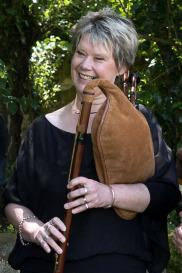The Bagpipe Society
Grace Notes

Welcome to another edition of Chanter! I’m hoping that for you, like me, music and performance opportunities are beginning to open up again – whether that’s simply being able to listen to live music (not experienced through a screen or headphones) or being able to meet and play in person with other musicians and friends. It wasn’t until I met with my bandmates for a rehearsal after 15 months that it struck home just how much I had missed the comradery and sheer joy of playing with others. It was a bit of a slow and tentative start but then, it all fell back into place and we were all playing as though there had been no interruption.
In this edition, I’m very pleased to be able to feature not one, but two articles on the pastoral bagpipe. It has been a few years since this journal has featured this bagpipe in its pages and then, just like the elusive No 64 bus, two features come along at once! Their submission, coincidentally, follows on from a Society member writing to me suggesting that it would be good to have a really in-depth article on the pastoral bagpipe - I can now sit back, smile, relax and say ‘I have done my job’! I remember, many years ago, in the late ’90s/early ’00s, first discovering this bagpipe when Jon Swayne wrote about the instrument as well as giving a presentation on it at the Blowout. I had not been familiar with pastoral pipes until this point and I was fascinated by their history, together with possibilities that the instrument opened up in terms of repertoire. Needless to say, it is an instrument on my ‘Wish List’ but suspect it will be so for a good few years yet! I would like to thank Jon for bringing Christoph Heyl’s article to my attention and also for being my ‘cover star’ and keeping the pastoral idyll alive in more ways than one.
I am sad to carry reflections on two influential people lost to us recently from the bagpipe world. They come from very different musical traditions and backgrounds but both had a lasting and far reaching impact: Paddy Shaw from Norfolk who introduced many people to the French bagpipe and gurdy repertoire during the late ‘80's through the Massif Village Orchestra, and Dimitris Koukas, the tsambouna player from Mikonos, who helped keep alive a musical tradition which could have so easily disappeared were it not for him.
The Bagpipe Society is not, in any way, a political forum but what has been shown in Chanter over the years, in its exploration of the roots of bagpipes and its music, is that the bagpipe has played its part in politics. It has been used as a tool for helping cement a cultural identity in many parts of the world and even a name can carry a political message, as illustrated later by the pastoral pipes’ successor, the Union bagpipe. So, I make no apology for reporting on the worrying state of affairs from Belarus with the recent arrest of several bagpipers who took part in a populist rally last summer. I remember watching the news footage from August 2020 and being overjoyed to see bagpipes leading the masses in a friendly and peaceful display of people’s solidarity. I hope that by the time this edition finally hits your doormats that the members of Irdorath have been released without charge.
From Chanter Autumn 2021.
- Data Processing Notice (GDPR)
@BagpipeSociety on X (formally known as Twitter)
TheBagpipeSociety on Instagram
 BagpipeSociety on Facebook
BagpipeSociety on Facebook
Something wrong or missing from this page? Let us know!
